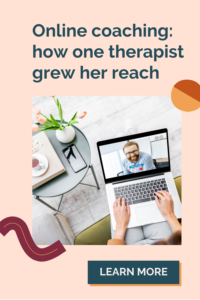Janika Beasley is a licensed family therapist and counselor in Pennsylvania and New Jersey. She started her practice, Amavi Therapy (translated to “I love”), in 2014, and recently decided to expand her reach and impact by selling online coaching services.
Keep reading to dive into her successful practice and how she moved into selling online offers.
Table of Contents
Toggle1. What made you interested in moving into an online space?
Many times it’s hard to get people into a room – as couples show up, there is always one person more invested than the other. And, people aren’t always willing to air out their dirty laundry. I wanted to provide something couples could do at home if they weren’t completely ready for counseling or sitting in a possibly tense space.
2. Before connecting with Alison, what kind of research did you do? What did you already start regarding your switch to online?
I started working with couples, taking some of those theories and compiling that into a course on conflict. Being in a room with a couple is very different from being in an online space. As much as I enjoyed creating the course, I knew I didn’t know enough! I recognized I needed some guidance. I originally wasn’t looking to become a coach, but later realized it’s right up my alley.

3. What about coaching appeals to you?
Working with couples, I found that there is only so much insight you can give someone. At a certain point, the person is aware of their stuff and needs to know where to go with it. A lot of couples come in wanting tools and to practice skills, which is already what I do – so I thought, “why not also coach couples through that?”
As a therapist, I’m in it with you and as a coach, I want to teach you these things so you no longer need me. Therapy can be a long process and if people don’t feel like they’re getting results fast enough, they’ll get discouraged. With coaching couples, I feel like it allows couples to see results faster.
4. How do you distinguish when someone will need online coaching vs. therapy? How are they different in terms of marketing?
If there is a lot of trauma, past situations to get through and clients want to find out what the causes of their problems are, therapy seems like the better option.
If the couple or individual is mostly aware of their problems and are seeking guidance in the next steps to be a better them, online coaching would be the way to go.
To put it simply, therapy is more for the past while coaching is more for the future.
I also love that I am able to be more present with online coaching than with therapy. With therapy there are a lot more boundaries and clients don’t generally reach out when something is happening in the moment. Therapists don’t generally share anything about themselves, and that feels weird to me because I value the relationship with my clients. I feel I can share more of myself and be on the journey with my clients in a different way.
The marketing of the two is very different. For therapy, there are plenty of directories that you can just add your profile to, and that’s it! For online coaching, I had to make a big shift, and learn how to show people that they need what I’m providing and that I can find solutions for their problems.
5. What did your coaching focus end up being?
What started off as a couple coaching course, became coaching women who have gone through a divorce or breakup and are ready to start getting themselves back out there. This is a vision of love and experience, because I’ve been there.
The offer involves learning how to heal yourself before being in another relationship, creating boundaries, learning our patterns, and creating a plan on who we want to be, who we want to be with, and how we can engage with another person.
6. What did you change to gain online coaching clients?
Finding clients was a challenge for me because I did not know how to market. Putting myself out there is something I have to practice regularly – being the expert but not being over the top with it.
Having conversations rather than sales calls and almost piggybacking how I do consultations for therapy really helped me. I had to learn how to introduce someone to my offer without giving too much away and without being sales-y. Once that mindset shifted for me, it was much easier to have sales calls and give people a taste of what it would be like with me as their coach.
7. What advice do you have for new therapists?
Nothing will ever be perfect, let that go. When you’re new with working with people, you will tend to want to fix everything for someone and make it all perfect. You can’t. You can’t work harder than your client. As a new clinician we tend to do that because we want people to see results, but it’s about empowering them to do the work. We are not fixing people; it’s not all on us.
Get rid of the piece of thinking you’re going to fix someone, it will let you be a little more human. Make mistakes and learn from them.
8. What advice do you have for people wanting to move into the online coaching space?
Learn marketing! Coming from therapy, we don’t learn anything about business or how to market!
There is often this competition between coaches and therapists, and it really doesn’t matter as long as we’re helping people. If you are considering introducing coaching to your list of services, you have to be really intentional because it is really different. You can’t do the same things with therapy and coaching, it’s a completely different space and it won’t come overnight so stay consistent!
If you want to explore Janika’s services, click here: Amavi Therapy.
Janika also has a Facebook Group where she shares content on relationships and how to help women slip into their own power: Authentic Self-Love and Relationships.
Curious about getting a business coach for female entrepreneurs? Check out this post.
Free: Mindful Marketing Newsletter
Join 6,500 others on our newsletter.

